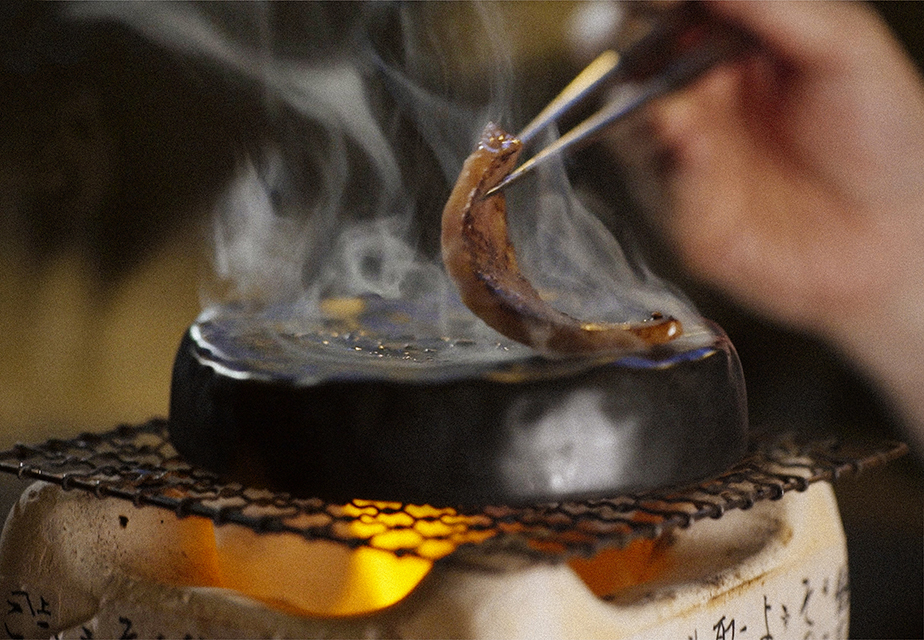By Tiffany Ran
Northwest Asian Weekly

![]()
![]()
![]()
![]()
Chef Nobuo Fukuda never quite felt like he fit into the rigid confines and strict culture of his family in Japan. He moved to the United States at the age of 19 seeking a different life, working in a ski patrol before becoming a self-taught chef and opening his own restaurant, Nobuo, at Teeter House in Phoenix, Ariz., and winning a James Beard Award for Best Chef Southwest in 2007.
A childhood experience with a moon rock was Fukuda’s first bridge to American culture. His father wished for Fukuda to be “kakehashi,” — a bridge between Japanese culture and the rest of the world. “Kakehashi: A Portrait of Chef Nobuo Fukuda” is Seattle-based filmmaker Andrew Gooi’s first full-length film derived from “Food Talkies,” Gooi’s series of food shorts, which earned him two James Beard nominations this year.
Gooi studied and worked as an engineer in Arizona and picked up filmmaking as a hobby. During an economic downturn, Gooi jumped into professional video work and he was hired as a videographer by a grocery company to create videos introducing their food.
“Food Talkies” was born from his desire to create a cinematic short introducing a pig trotter vinegar soup made by his grandmother. The series became his hobby and passion project, which Gooi did for free alongside his full-time job.
“Food Talkies” came with a wave of cinematic chef-focused food media, like “Chef’s Table,” “Mind of a Chef,” and “Jiro Dreams of Sushi,” but Gooi chooses to spotlight lesser known chefs including Gloria Perez, the matriarch behind Seattle’s famed La Carta de Oaxaca, and Mr. Tam, a Hong Kong pastry chef making mooncakes by hand, to name a few.

“It’s because of films like ‘Chef’s Table’ and ‘Jiro,’ because of people like [David Gelb] and other filmmakers, who have created food documentaries, that I’ve been fortunate to have this platform and interest,” said Gooi.
“I jokingly tell people I’m the poor man’s ‘Chef’s Table.’ There’s a lot of chefs and individuals who are not chefs, but have great food stories in this world and we’re all kind of doing our part in capturing the story.”
Fukuda is no Jiro, Gooi is quick to say. It’s easy with the rise in popularity of films like “Jiro” for many to view Fukuda, his food, and “Kakehashi” as being similar, but this is not the case.
“As I filmed more, I realized that Chef Nobuo’s story is misunderstood from a lot of editorials in Arizona that I read. A lot of times, he’s treated like Jiro, a chef that’s been perfecting something for 20 or 30 years, and he’s so anti-that. He’s not anti as in he hates it, it’s just that he’s so free-spirited to be bogged down by one thing. That’s one of the main reasons why he left Japan,” said Gooi.
In “Kakehashi”, the narrative switches between the peace and serenity Fukuda has in his present as a chef at Teeter House, with the frenetic energy of Japan where he returns to revisit and recount his past. Fukuda did not set out to be kakehashi, but his father’s words remained in his mind, and became the title of a film that chronicles his journey to his restaurant kitchen in Arizona. His menu, diverse in range and techniques, include an amalgamation of flavors that include raw fish and yuzu, to balsamic vinegar and parmesan cheese.
At Teeter House, Gooi introduces majestic lighting, a serene pace, and a languid storytelling of Fukuda’s past. In Japan, Fukuda walks among the busy fish market, catches up with old friends at a karaoke bar, and interacts with his sister in their childhood home. His life, now made up of the juxtaposition of these two opposing places, comes together in this 45-minute biopic where skilled pacing plays as strong of a role in narrative as the actual story itself. “Kakehashi” contains much of the cinematic elements that resemble mainstream food documentaries, but evolves beyond a mere glorification of a chef’s craft to tell an immigrant story where one builds homes in two countries, and creates a legacy that acts as a bridge between cultures.
For more information about Food Talkies and “Kakehashi,” visit foodtalkies.com.
Tiffany can be reached at info@nwasianweekly.com.

